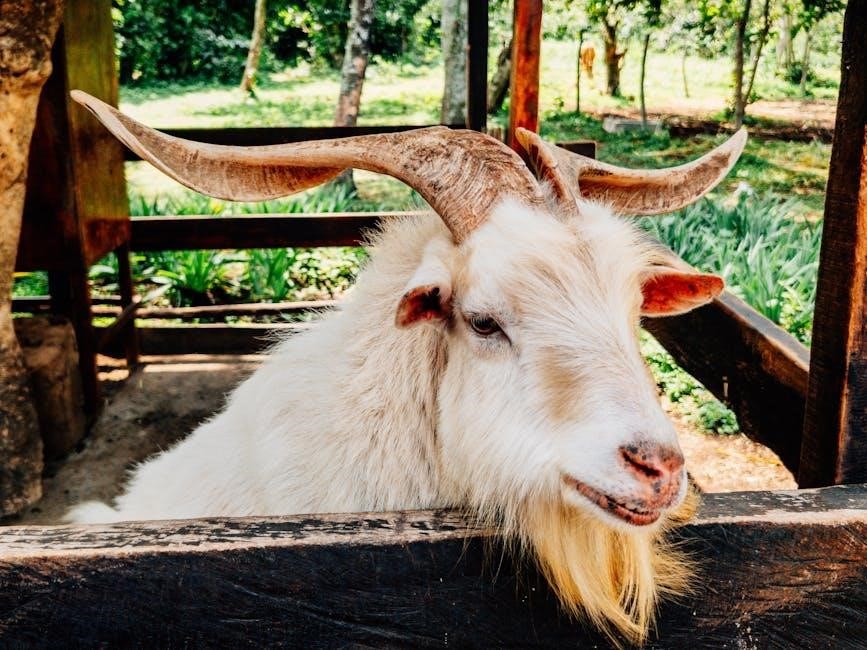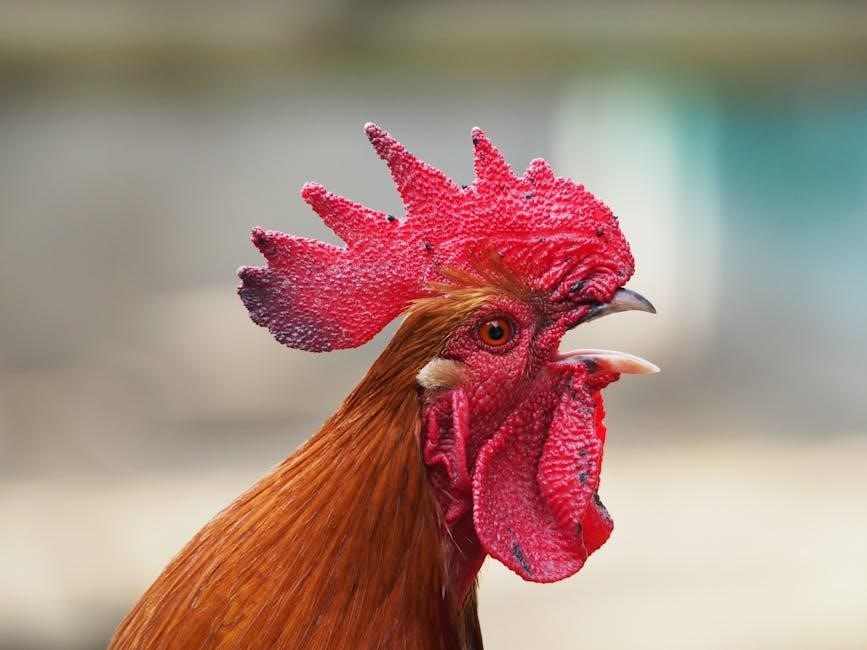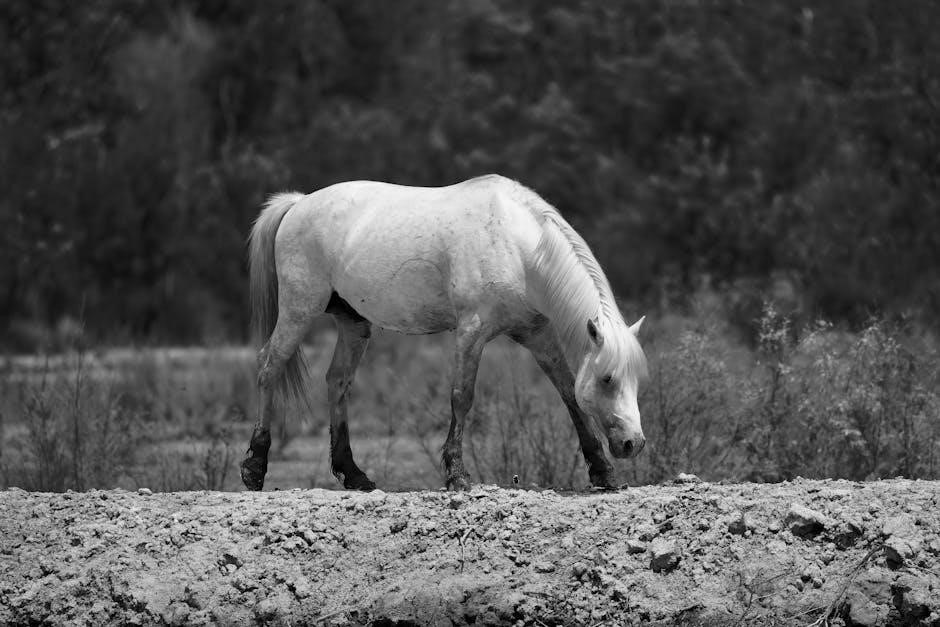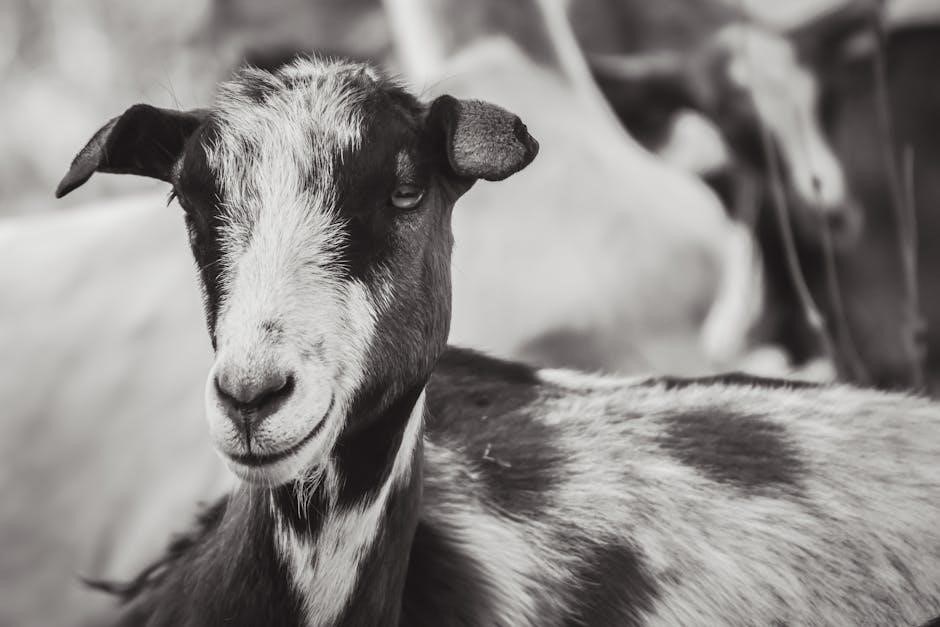Chapter 1 of Animal Farm introduces the setting and main characters‚ focusing on Old Major’s pivotal speech that sparks the animals’ rebellion against oppression.
1.1 Overview of the Chapter
Chapter 1 sets the stage at Manor Farm‚ where Mr. Jones’s neglect and drunkenness create unrest among the animals. Old Major‚ a wise boar‚ calls a meeting in the barn‚ inspiring the animals with his vision of a world free from human oppression. His speech sparks hope and unity‚ laying the foundation for the rebellion that will unfold‚ introducing key themes and characters that drive the story forward.
1.2 Setting the Stage for the Story
Manor Farm‚ under Mr. Jones’s neglectful ownership‚ becomes a symbol of oppression. The drunken farmer’s careless management creates unrest‚ prompting Old Major to call a meeting in the barn. This gathering marks the beginning of the animals’ unity and shared vision for change‚ setting the stage for rebellion and the eventual rise of Animal Farm‚ fueled by their collective desire for freedom and fairness.

The Meeting in the Barn
The meeting in the barn is pivotal‚ as it unites the animals and sparks their rebellion against Mr. Jones‚ setting the story’s events in motion.
2.1 Old Major’s Speech
Old Major‚ a wise boar‚ delivers a powerful speech in the barn‚ condemning the exploitation of animals by humans. He shares a dream of a world where animals are free‚ united‚ and self-sufficient. His impassioned words ignite hope and inspire rebellion‚ laying the foundation for the animals’ collective action against their oppressive ruler‚ Mr. Jones.
2.2 The Animals’ Reaction to the Speech
The animals are deeply moved by Old Major’s speech‚ feeling a sense of unity and purpose. They enthusiastically embrace his vision of freedom‚ inspiring hope and determination. The pigs‚ led by Snowball and Napoleon‚ take charge‚ while others like Boxer pledge their loyalty. This collective response sets the stage for the rebellion against Mr. Jones.

Key Characters Introduced in Chapter 1
Old Major‚ Mr. Jones‚ and the animals‚ including pigs like Snowball and Napoleon‚ Boxer‚ and others‚ are introduced‚ setting the stage for their roles in the rebellion.
3.1 Old Major: The Catalyst for Rebellion
Old Major‚ a wise and aged boar‚ delivers a powerful speech in the barn‚ inspiring the animals to rebel against Mr. Jones and envision a utopian future without human oppression. His passionate address ignites the spark of resistance‚ emphasizing the need for unity and the elimination of man’s tyranny. His words become the foundation of Animalism.
3.2 Mr. Jones: The Drunken Farmer
Mr. Jones‚ the careless and drunken owner of Manor Farm‚ embodies the neglect and exploitation of the animals. His intoxication often leads to forgetfulness‚ such as failing to secure the farm properly‚ showcasing his irresponsibility. His character symbolizes the oppressive nature of human rule‚ provoking the animals’ desire for liberation and inspiring Old Major’s call to rebellion against such tyranny.
Themes and Symbolism in Chapter 1
Animalism‚ introduced by Old Major‚ emphasizes unity and equality among animals‚ advocating for a collective effort to overthrow oppressive human rule and establish a fair society.
4.1 The Concept of Animalism
Old Major introduces Animalism‚ a philosophy advocating for animal unity and rebellion against human oppression. He emphasizes the importance of self-reliance and collective effort‚ urging the animals to reject their exploitative conditions. This ideology serves as the foundation for the animals’ quest for freedom and equality‚ contrasting sharply with the corrupt human system they endure. Animalism’s principles inspire hope for a utopian future‚ free from tyranny. The animals‚ motivated by Old Major’s vision‚ begin to envision a society where they can thrive independently‚ paving the way for their eventual rebellion. This concept is central to the chapter‚ setting the stage for the events that will unfold. Through Animalism‚ Orwell critiques societal hierarchies and the abuse of power‚ resonating with themes relevant to human history. The animals’ embrace of Animalism marks the beginning of their journey toward autonomy and self-governance‚ highlighting the chapter’s significance in establishing the novel’s core themes.
4.2 The Role of Power and Corruption
Chapter 1 introduces the corrupting influence of power through Mr. Jones‚ the drunken farmer‚ and hints at the future rise of the pigs as leaders. Old Major’s speech criticizes human exploitation‚ subtly foreshadowing the pigs’ eventual corruption. The chapter establishes the theme of power dynamics‚ highlighting how authority can be misused and how even noble ideals can lead to oppression. This sets the stage for exploring the dangers of unchecked power.

The Animals’ Vision of a Better Future
Old Major shares his vision of a utopian society free from human tyranny‚ envisioning abundance‚ happiness‚ and freedom for all animals‚ inspiring hope and collective aspiration.
5.1 Old Major’s Dream of Freedom
Old Major vividly describes a future where animals live without human oppression‚ working collectively to sustain themselves. He envisions freedom‚ abundance‚ and joy‚ inspiring the animals to strive for a utopian society where they are self-sufficient and free from exploitation.
5.2 The Pigs’ Leadership and Ambitions
The pigs‚ led by Old Major‚ emerge as natural leaders due to their intelligence and foresight. They organize the meeting and articulate the vision of a better future‚ showcasing their ambition to guide the rebellion. Their leadership is initially met with trust‚ as they seem committed to the collective good of all animals on Manor Farm.
The Historical Context of the Chapter
The chapter reflects the Russian Revolution’s influence‚ with Manor Farm mirroring the oppressed society and Old Major symbolizing revolutionary leaders who inspire change and rebellion.
6.1 The Influence of the Russian Revolution
Chapter 1 of Animal Farm mirrors the Russian Revolution‚ with Manor Farm symbolizing pre-revolutionary Russia. Old Major’s speech echoes Lenin’s role‚ inspiring rebellion against oppression. The animals’ unity and desire for change reflect the proletariat’s struggle‚ while Mr. Jones represents the corrupt Tsarist regime. Orwell’s allegory draws clear parallels between historical events and the novel’s narrative‚ highlighting themes of revolution and societal upheaval.
6.2 Orwell’s Use of Allegory
Orwell employs allegory in Chapter 1 to critique totalitarianism and explore themes of power and corruption. The animals represent historical figures and classes‚ while Manor Farm symbolizes Russia. Old Major’s speech mirrors revolutionary ideologies‚ and the pigs’ leadership foreshadows the rise of a new elite. This narrative technique allows Orwell to convey complex political ideas through a simple‚ relatable story‚ making the critique universally understandable and impactful.
The Significance of Chapter 1 in the Novel
Chapter 1 lays the foundation for the novel‚ introducing key themes‚ characters‚ and setting. It establishes the animals’ motivations and sets the stage for their rebellion‚ making it crucial for understanding the story’s progression and central ideas.
7.1 Foreshadowing Future Events
Chapter 1 subtly foreshadows the rebellion and subsequent power struggles. Old Major’s speech highlights the animals’ oppression‚ inspiring unity and rebellion. The pigs’ eagerness to lead and their intellectual dominance hint at future corruption. Mr. Jones’s neglect and drunkenness symbolize the vulnerability of human rule‚ setting the stage for the animals’ uprising and the eventual rise of a new order.
7.2 Establishing the Novel’s Tone
Chapter 1 sets a somber and reflective tone‚ introducing the oppressive atmosphere of Manor Farm. Old Major’s impassioned speech and the animals’ unified response create a sense of urgency and hope. The descriptive language used by Orwell evokes a mood of impending change‚ blending idealism with undertones of moral complexity‚ which permeates the rest of the novel and shapes its narrative direction.

Critical Analysis of Chapter 1
Orwell masterfully introduces themes of oppression and rebellion through Old Major’s speech‚ setting the stage for a deeper exploration of power dynamics and societal corruption.
8.1 The Use of Characterization
Orwell skillfully introduces characters like Old Major‚ Mr. Jones‚ and the pigs‚ using their traits to foreshadow future dynamics. Old Major’s wisdom and Mr. Jones’s negligence highlight the contrasting values‚ while the pigs’ eagerness and intelligence subtly suggest their leadership ambitions‚ creating a layered foundation for the story’s themes and conflicts.
8.2 The Impact of Old Major’s Legacy
Old Major’s speech ignites the animals’ desire for freedom‚ leaving a lasting legacy that shapes their rebellion. His vision of a world without human tyranny inspires unity and hope‚ motivating the animals to seek change. His ideas lay the groundwork for Animalism‚ influencing the pigs’ leadership and the eventual pursuit of self-governance‚ making his legacy central to the novel’s unfolding events.
Chapter 1 of Animal Farm sets the stage for rebellion‚ introducing key themes and characters. Old Major’s speech sparks hope‚ driving the animals toward a new future.
9.1 Summarizing the Key Points
Chapter 1 introduces the rebellion’s spark through Old Major’s speech‚ emphasizing freedom and equality. The animals unite‚ driven by hope‚ while Mr; Jones’s negligence highlights their oppression. Key characters emerge‚ and themes of power and idealism are established‚ setting the stage for the novel’s exploration of corruption and societal change‚ deeply rooted in historical allegory.
9.2 The Transition to Chapter 2
The end of Chapter 1 leaves the animals united and hopeful‚ inspired by Old Major’s vision. This momentum carries into Chapter 2‚ where the pigs step forward as leaders‚ outlining the principles of Animalism. The transition highlights the shift from idealism to action‚ setting the stage for the rebellion and the eventual rise of a new order on Manor Farm.